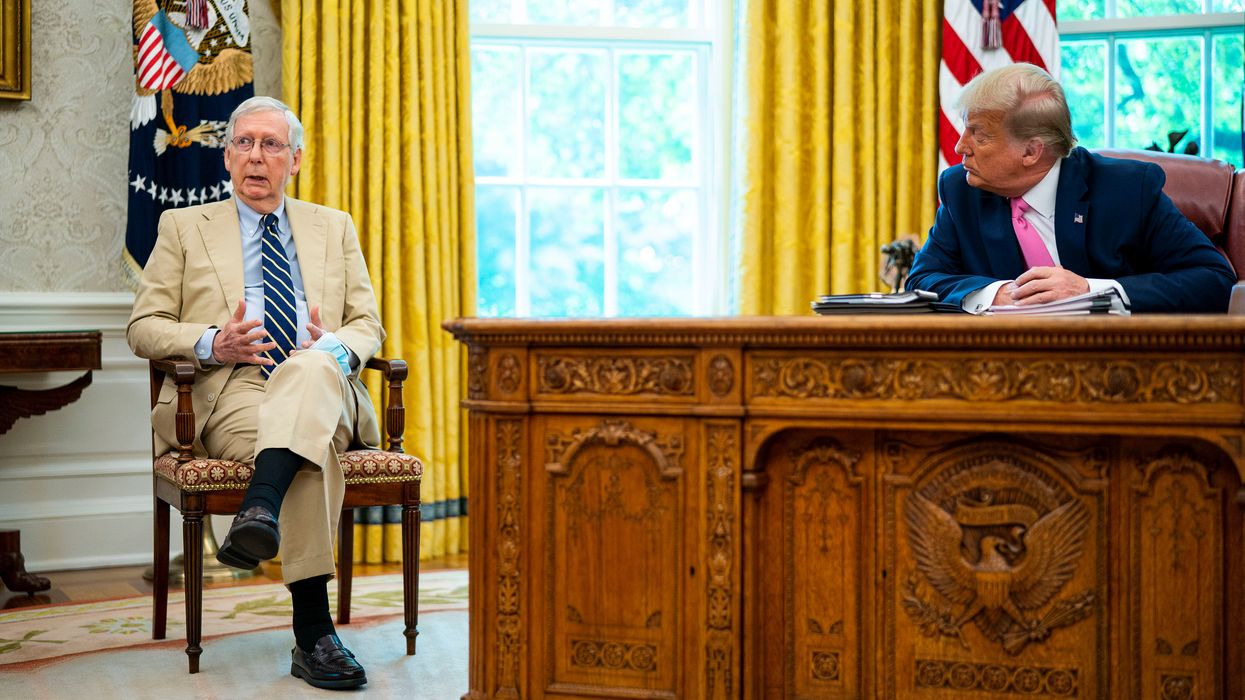As negotiations intensify on the final major coronavirus relief package before November, a last-ditch if somewhat optimistic lobbying push is underway to get hundreds of millions for safe and comprehensive elections into the bill.
Top administration officials spent much of Tuesday at the Capitol, laying out President Trump's opening bid to congressional leaders of both parties. While his proposed payroll tax cut, school funding and aid to state and local governments will get headlines, there's also a looming clash over aid for states to conduct the general election.
Trump is emphatically opposed to expanded voting by mail, falsely claiming it's a proven incubator of substantial election fraud. But many Republicans in Congress say that, since a surge of absentee voting is inevitable because of the pandemic, they should help election administrators pay for equipment, supplies and people who can assure the voting is perceived as comprehensive and the results accurate.
The Republican position on the money could become plain Wednesday at a Senate hearing on election preparations chaired by Roy Blunt of Missouri, the member of the GOP leadership who is running point on the issue. He's signaled he's willing to support more election aid, so long as no federal mandates are attached, but has not said how much.
Adding pressure on the issue, half a dozen prominent former Republican administration officials urged Congress on Monday to spend what it takes to assure a reliable election — arguing that doing otherwise would endanger the country.
"American elections, the bedrock of our democracy, face two extraordinary challenges this year: Covid-19 and combating foreign interference. While these twin challenges are first and foremost a test of our democracy, they are also a threat to our national security," they wrote in a letter also signed by more than two dozen other career diplomats, national security leaders and former senior Democratic officials.
"Hostile foreign actors like China, Iran and Russia seek to cast doubt on the integrity of our electoral systems," they wrote, "by exploiting fear and confusion around the voting process. Failing to make sure that all citizens can vote safely and securely will only give them material to further erode faith in our democratic system."
The majority Democrats included $3.6 billion in the relief package the House passed in May, which experts and advocates say would cover all the anticipated costs. But the overall size of that measure topped $3 trillion, an amount that seems destined to shrink in negotiations over the next two weeks. The White House's initial offer is about $1 trillion.
Majority Leader Mitch McConnell would almost certainly have to endorse whatever amount Blunt might cite as a counteroffer for smooth balloting. McConnell, for example, signed off on the $400 million Congress delivered to election officials in March, an amount they said was welcome but wholly inadequate.
Blunt has arranged for a receptive audience at the hearing he's convened as chairman of the Rules and Administration Committee, which has jurisdiction over election law. The two main witnesses are conservative GOP secretaries of state in reliably red states who have nonetheless lobbied publicly for more help — Mac Warner of West Virginia and Tre Hargett of Tennessee.
One-quarter of ballots arrived in the mail in the 2018 midterm election. Experts say that share is sure to double and could nearly triple nationwide, no matter what the states do or don't do to get ready, as people do what they can to avoid standing with strangers in long lines in enclosed spaces.
Tabulating the unprecedented ocean of mail, which could arrive especially slowly given the Postal Service's beleaguered state, could cause similarly unprecedented delays after Nov. 3 in producing conclusive results — and those delays would stretch much longer unless election officials can arrange for more people and equipment in time.
The group of former national security leaders who wrote Congress was assembled by the Brennan Center for Justice, one of the most prominent among the mostly progressive civil rights and good-government advocacy groups lobbying for the money.
GOP signers included former Defense Secretary Chuck Hagel and two former Homeland Security secretaries, Tom Ridge and Michael Chertoff. Democratic signers included former Secretaries of State Madeleine Albright and John Kerry, former Homeland Security Secretary Janet Napolitano and former national security advisor Susan Rice, who's now on Joe Biden's shrinking list or running mate options.
A separate group of 31 left-leaning groups, meanwhile, has launched an intense round of grassroots campaigning for the funding — including digital advertisements, text messaging and community outreach designed to press allies of the groups' to importune their own senators.
"We're running out of time. Failing to pass this funding is not only an abdication of responsibility, but a clear attempt to suppress the vote in the middle of a pandemic," Sean Eldridge, president and founder of Stand Up America, said in a statement. "The Senate must act this week."
It was the coalition he assembled that had demanded McConnell and other Republican leaders cut short their July recess to start working on the new recovery package. That call went unheeded, but Congress and the White House are under pressure to reach agreement by the start of August. That's when the special pandemic unemployment benefits will otherwise run out — and when lawmakers are supposed to leave the Capitol for as long as five weeks, in part because of the two now-minimized presidential nominating conventions.




















Marco Rubio is the only adult left in the room